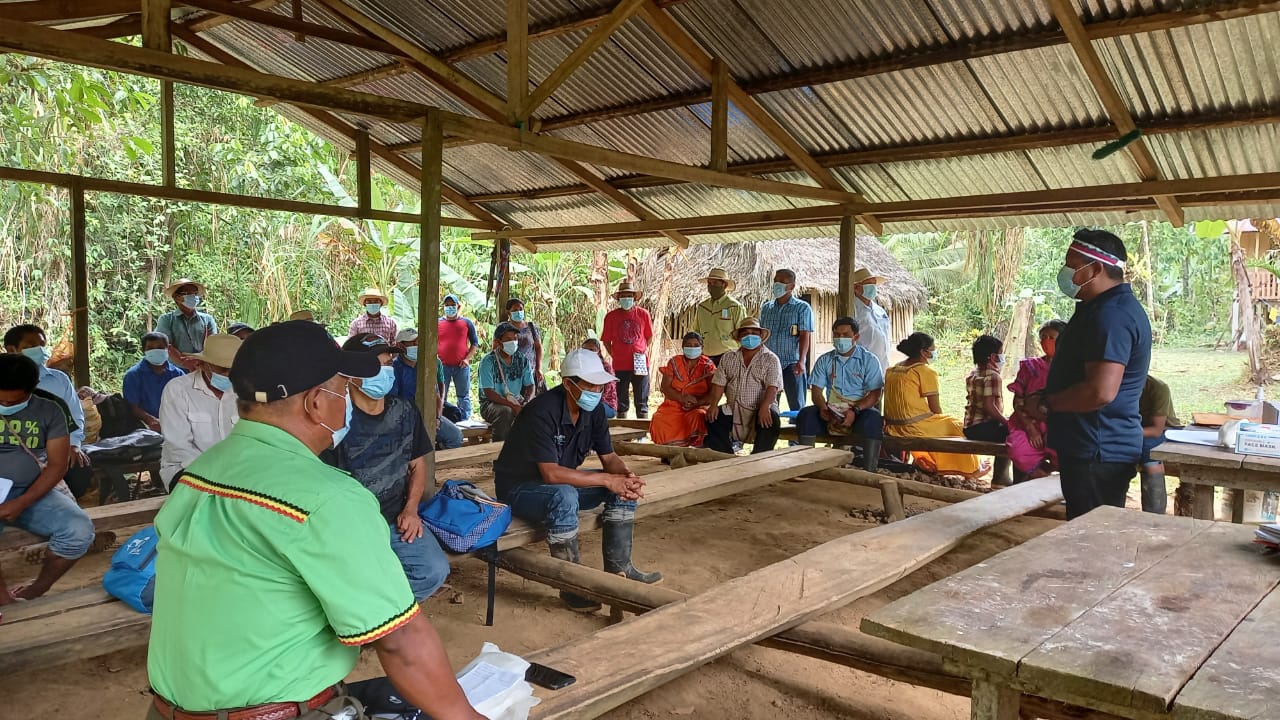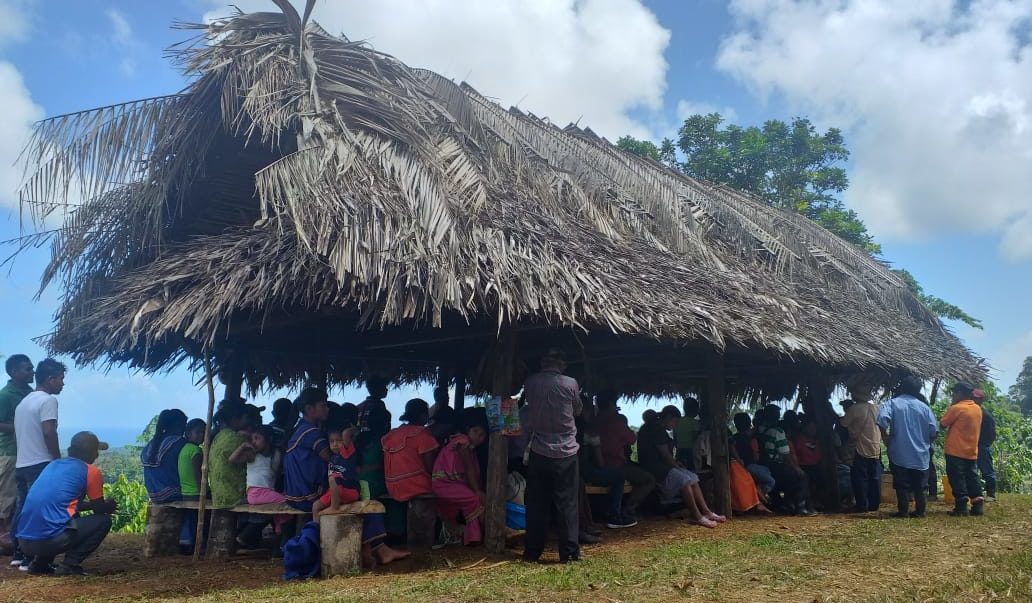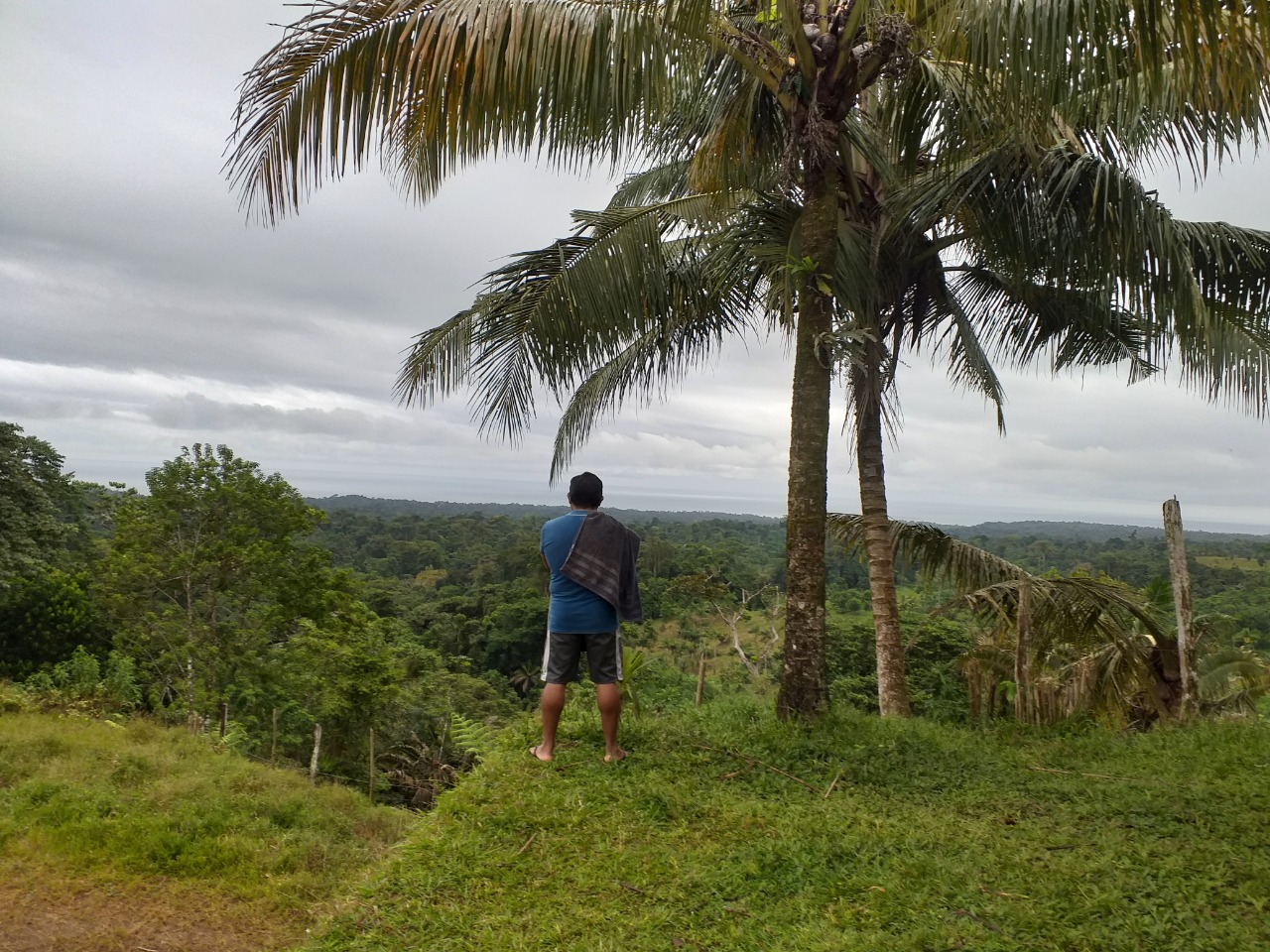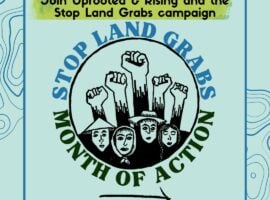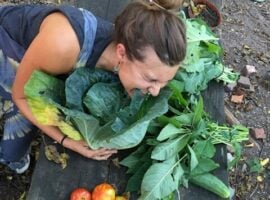by Betty Fermin & Kristen Wyman
Lee el articulo en español abajo
The rights of Indigenous peoples and the fight for climate justice are inextricably linked. In extractive industry (the extraction of earth’s raw material for added value), Free Prior Informed Consent (FPIC) is standard international law that recognizes the importance of community participation in decision making processes related to extractive industry development. Avoiding these international legal standards has historically led to a multitude of climate-related issues, including chemical contamination, adverse health impacts on local peoples, and continued over-reliance on finite resources that compound any attempts at emissions reduction.
El Movimiento por la Defensa de los Territorios y Ecosistemas de Bocas del Toro, The Movement in Defense of Territories and Ecosystems of Bocas del Toro Archipelago (MODETEAB), is a movement committed to the defense of indigenous rights and cultures in Panama and has actively denounced and called to action the Panamanian government and organizations to the Fourth Transmission Line, a project with over 900 towers delivering high voltage power transmission across three ecological reserves and the Ngäbe territories.
Betty Fermin and Kristen Wyman, of the Global Movements Program at WhyHunger, spoke with Feliciano Santos, the General Coordinator of MODETEAB, about the current situation in Panama, the history of the Fourth Transmission Line, and the ongoing struggles of the Indigenous peoples of Panama. The interview has been condensed for brevity.
Betty: Hello, we’re glad to talk to you and learn more about the situation occurring now around the territory of the Ngäbe people, title holding and the background of the 4th transmission line. Can you explain to us about what has been going on and what the situation is currently?
Feliciano: My greetings to you both.
We’re from a town that has 10,000 inhabitants living there and as of a long time ago they’ve been claiming the territory and the government has refused to recognize their rights because they want to create various projects like the Fourth Transmission Line and extract from the rivers as well. The area is very rich in materials, such as gold that can be extracted, and so that’s why the government has refused to recognize the rights and have been reclaiming the territorial rights.
In 2017, there was a project of the Fourth Transmission Line that needed to happen since it’s been in process for a long while and the government went through a process of giving a loan from the International Finance Corporation (IFC) to the World Bank. They gave a loan to the private corporation, Empresa Transmisión Eléctrica S.A. (ETESA) of $2 million dollars to realize a study of an environmental impact.They are dedicated to electrical energy and they export and sell energy. We as an organization have denounced this since that has been against our Indigneous rights and the Compliance Advisor/Ombudsman (CAO), which is the accountability mechanism of the IFC of the World Bank, have come to see the issue and have been mediating the process. We kept on pushing and the corporation didn’t want to be in conversation with us and when we went into the investigative process, the pandemic happened. 602084 is the number of the project of the IFC. It’s a national corporation in Panama, so when the pandemic happened and the IFC couldn’t come to Panama to continue investigating, they’ve had conversations virtually with the CAO to see what the strategy could be to continue the investigation process. At the government level they don’t want to talk, and so they created a protected area in the territory in the Indigenous community called Héctor Gallego, in the North District of Santa Fe in May 2019. The Indigenous communities that live in this area consider this decision to be an unconsulted imposition, in addition to threatening their rights to their ancestral lands. The creation of this protected area, as well as the construction of the Fourth Transmission Line on their lands is egregious and MODETEAB continues to denounce these initiatives publicly and in the Panamanian press.
So the fight is rather long and the community is invaded by foreigners coming to get the land and saying they are creating projects with the Indigenous communities when they’re actually stealing the land and have the validity of the government and the authorities that have allowed them to come to the area. We’re working to organize the community, to understand their territorial rights as Indigenous people, and to work together to stop the advances of the foreigners.
So we’ve asked for an audience in Geneva, which happened on November 3rd, 2020 and we have sent a report to the Committee of Social, Cultural, and Economic Rights to detail the situation. The government is feeling pressured at the international level and so with all these different venues, we’re thinking that they are going to have to sit with the community to seek an alternative to the problem. We described the social and environmental impact that the transmission line will have and we have detailed the lack of recognition of the Ngäbe people.
Kristen: You named some legal mechanisms as recourse to the lack of recognition, how does that relate to the UNDRIP (the UN Declaration of Indigenous Rights)?
Feliciano: We’re knocking on all the doors, internationally. The Universal Periodic Review of the United Nations is an organism of the state that helps Indigenous peoples and we’ve been going to the Inter-American Commission on Human Rights and we’ve been taking all the chances to reach folks participating; for example we presented our case to Congressman James McGovern.
Kristen: Can you elaborate on what free, prior and informed consent and sovereignty mean to you and the Ngäbe people?
Feliciano: It’s fundamental. Here in Panama, there is a Law 37 that talks about free, prior informed consent. So, if the government is talking about consent, the state has to follow that decree. The theme of sovereignty is accompanied by history because that’s the land that is worked and cultivated. Indigenous peoples are working socially and culturally. It’s the food that is given to the kids when they are born and grow as men and women and it’s the product that is sold to be able to support ourselves and our neighbors. We are able to mutually support each other when folks don’t have enough to eat. In our territories we have a lot of space, the mountains, the rivers,…and so if we lose the lands, it’s taking our way of life as people and of future generations. The theme of prior, free and informed consent is fundamental. Food sovereignty is fundamental. The theme of territory is fundamental so that the Ngäbe people can live as free folks in their territory.
Betty and Kristen: What is the call to action to folks in the U.S and globally?
Feliciano: The Ngäbe people ask that they are listened to, that the government respect their territory and that the international and national standards are respected. They demand that the culture is respected, that Indigenous people are respected in their ways of living with their mountains and rivers. We ask NGOs and international organizations to demand that the Panamanian government respect the rights of the Indigenous peoples, and in this case denounce the occupation of the territory and listen to the women of Santa Fe demanding the respect of their gifts as women, the rights of the children and the elders. They’ve lived their whole lives and their generations are still there. So the call is to respect this history and to knock on the doors of these institutions so the voice of the affected communities is heard. We say that to fight the Indigenous fight we are able to combat climate change, which is a global problem, so together we are combating this problem by supporting our indigenous communities.
WhyHunger stands in solidarity with Ngäbe peoples and calls on the international community, our partners and allies, to elevate awareness about the 4th transmission line and the legal agreements we must hold industry and government accountable to for the advancement of the rights of Indigenous Peoples.
— ESPAÑOL —
Los derechos de los pueblos indígenas y la lucha por la justicia climática están inextricablemente unidos. En la industria extractiva (la extracción de la materia prima de la tierra para obtener valor añadido), el Consentimiento Libre, Previo e Informado es una norma jurídica internacional que reconoce la importancia de la participación de la comunidad en los procesos de toma de decisiones relacionados con el desarrollo de la industria extractiva. Evitar estas normas legales internacionales ha conducido históricamente a una multitud de problemas relacionados con el clima, como la contaminación química, los impactos adversos sobre la salud de los pueblos locales y la continua dependencia excesiva de recursos finitos que agravan cualquier intento de reducción de emisiones.
El Movimiento por la Defensa de los Territorios y Ecosistemas de Bocas del Toro (MODETEAB), es un movimiento comprometido con la defensa de los derechos y las culturas indígenas en Panamá y ha denunciado activamente y llamado a la acción al gobierno panameño y a las organizaciones a la Cuarta Línea de Transmisión, un proyecto con más de 900 torres de transmisión de energía de alto voltaje a través de tres reservas ecológicas y los territorios Ngäbe.
Betty Fermín y Kristen Wyman, del Programa de Movimientos Globales de WhyHunger, hablaron con Feliciano Santos, Coordinador General de MODETEAB, sobre la situación actual en Panamá, la historia de la Cuarta Línea de Transmisión y las luchas actuales de los pueblos indígenas de Panamá. La entrevista ha sido condensada para ser más breve.
Betty: Hola, estamos contentas de hablar contigo y conocer más sobre la situación con el territorio del pueblo Ngäbe, la tenencia de títulos y los antecedentes de la 4ª línea de transmisión. ¿Puedes explicarnos sobre lo que ha estado pasando y cuál es la situación actual?
Feliciano: Mis saludos a las dos.
Somos de un pueblo que tiene 10.000 habitantes y desde hace mucho tiempo han reclamado el territorio y el gobierno se ha negado a reconocer sus derechos porque quieren crear varios proyectos como la 4ª línea de transmisión y extraer de los ríos también. La zona es muy rica en materiales, como el oro que se puede extraer, y por eso el gobierno se ha negado a reconocer los derechos y han estado reclamando los derechos territoriales.
En el 2017, hubo un proyecto de la Cuarta Línea de Transmisión que tenía que pasar ya que está en proceso desde hace mucho tiempo y el gobierno pasó por un proceso de dar un préstamo de lla Corporación Financiera Internacional (CFI) al Banco Mundial. Le dieron un préstamo a la empresa privada, Empresa Transmisión Eléctrica S.A. (ETESA) de 2 millones de dólares para realizar un estudio de impacto ambiental, ellos se dedican a la energía eléctrica y exportan y venden energía. Nosotros como organización hemos denunciado esto ya que ha sido en contra de nuestros derechos indígenas y el Compliance Advisor/Ombudsman (CAO), que es el mecanismo de rendición de cuentas de la CFI del Banco Mundial, ha venido a ver el tema y ha estado mediando en el proceso. Seguimos presionando y la corporación no quería estar en conversación con nosotros y cuando entramos en el proceso de investigación, ocurrió la pandemia. 602084 es el número del proyecto de la CFI. Es una corporación nacional en Panamá, así que cuando ocurrió la pandemia y la CFI no pudo venir a Panamá a seguir investigando, han tenido conversaciones virtualmente con la CAO para ver cuál podría ser la estrategia para continuar el proceso de investigación. A nivel gubernamental no quieren dialogar y por eso crearon un área protegida en el territorio en la comunidad indígena llamada Héctor Gallego, en el Distrito Norte de Santa Fe en mayo de 2019. Las comunidades indígenas que viven en esta zona consideran que esta decisión es una imposición inconsulta, además de amenazar sus derechos sobre sus tierras ancestrales. La creación de esta área protegida, así como la construcción de la Cuarta Línea de Transmisión en sus tierras es atroz y MODETEAB sigue denunciando estas iniciativas públicamente y en la prensa panameña.
Entonces la lucha es bastante larga y la comunidad está invadida por extranjeros que vienen a buscar la tierra y dicen que están creando proyectos con las comunidades indígenas cuando en realidad están robando la tierra y tienen la validez del gobierno y las autoridades que les han permitido llegar a la zona. Estamos trabajando para organizar a la comunidad, y entender sus derechos territoriales como pueblo indígena, y trabajar juntos para detener los avances de los extranjeros.
Por eso hemos pedido una audiencia en Ginebra, que se produjo el 3 de noviembre de 2020, y hemos enviado un informe al Comité de Derechos Sociales, Culturales y Económicos para detallar la situación. El gobierno se siente presionado a nivel internacional y por eso, con todas estas sedes, estamos pensando que van a tener que sentarse con la comunidad para buscar una alternativa al problema. Describimos el impacto social y medioambiental y el impacto que la línea de transmisión tendrá económicamente y detallamos la falta de reconocimiento del pueblo Ngäbe.
Kristen: Mencionaste algunos mecanismos legales como recurso a la falta de reconocimiento, ¿cómo se relaciona esto con la Declaración de Derechos Indígenas de la ONU?
Feliciano: Estamos tocando todas las puertas, a nivel internacional. El Examen Periódico Universal de las Naciones Unidas es un organismo del Estado que ayuda a los pueblos indígenas y hemos ido a la Comisión Interamericana de Derechos Humanos y hemos aprovechado todas las oportunidades para llegar a la gente que participa; por ejemplo, presentamos nuestro caso al congresista James McGovern.
Kristen: ¿Puede explicar con más detalle lo que significan el consentimiento libre, previo e informado y la soberanía para usted y el pueblo Ngäbe?
Feliciano: Es fundamental. Aquí en Panamá hay una Ley 37 que habla del consentimiento libre, previo e informado. Entonces, si el gobierno habla de consentimiento, el Estado tiene que seguir ese decreto. El tema de la soberanía va acompañado de la historia porque esa es la tierra que se trabaja y se cultiva. Los pueblos indígenas trabajan social y culturalmente. Es la comida que se da a los niños cuando nacen y crecen como hombres y mujeres y es el producto que se vende para poder mantenernos a nosotros mismos y a nuestros vecinos. Somos capaces de apoyarnos mutuamente cuando la gente no tiene suficiente para comer. En nuestros territorios tenemos mucho espacio, las montañas, los ríos,… y entonces si perdemos las tierras, es quitarnos nuestra forma de vida como personas y de las futuras generaciones. El tema del consentimiento previo, libre e informado es fundamental. La soberanía alimentaria es fundamental. El tema del territorio es fundamental para que el pueblo Ngäbe pueda vivir como gente libre en su territorio.
Betty y Kristen: ¿Cuál es el llamado a la acción para la gente en Estados Unidos y en el mundo?
Feliciano: El pueblo Ngäbe pide que se le escuche, que el gobierno respete su territorio y que se respeten las normas internacionales y nacionales. Piden que se respete la cultura, que se respete a los indígenas en sus formas de vivir con sus montañas y ríos. Pedimos a las ONGs y a los organismos internacionales que exijan al gobierno panameño que respete los derechos de los pueblos indígenas, y en este caso denuncien la ocupación del territorio y escuchen a las mujeres de Santa Fe que exigen el respeto a sus dones como mujeres, los derechos de los niños y de los ancianos. Ellos han vivido toda su vida y sus generaciones siguen ahí. Así que el llamado es a respetar esta historia y a tocar las puertas de estas instituciones para que se escuche la voz de las comunidades afectadas. Decimos que para combatir la lucha indígena somos capaces de combatir el cambio climático, que es un problema global, así que juntos estamos combatiendo este problema apoyando a nuestras comunidades indígenas.
WhyHunger esta en solidaridad con los pueblos Ngäbe y hace un llamamiento a la comunidad internacional, a nuestros socios y aliados, para que tomen conciencia de la 4ª línea de transmisión y de los acuerdos legales que debemos hacer cumplir a la industria y al gobierno para el avance de los derechos de los Pueblos Indígenas.


